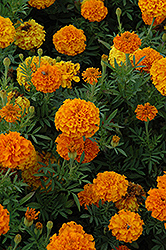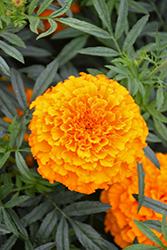It's all about ...
plants

Lady Orange Marigold
Tagetes erecta 'Lady Orange'
Height: 20 inches
Spread: 10 inches
Sunlight:
![]()
![]()
Hardiness Zone: (annual)
Other Names: African Marigold, Mexican Marigold
Group/Class: Lady Series
Brand: Ball
Ornamental Features
Lady Orange Marigold features bold orange ball-shaped flowers at the ends of the stems from early summer to mid fall. The flowers are excellent for cutting. Its fragrant ferny leaves remain dark green in colour throughout the season.
Landscape Attributes
Lady Orange Marigold is an herbaceous annual with an upright spreading habit of growth. It brings an extremely fine and delicate texture to the garden composition and should be used to full effect.
This is a relatively low maintenance plant. Trim off the flower heads after they fade and die to encourage more blooms late into the season. Deer don't particularly care for this plant and will usually leave it alone in favor of tastier treats. It has no significant negative characteristics.
Lady Orange Marigold is recommended for the following landscape applications;
- Mass Planting
- Border Edging
- General Garden Use
- Container Planting
Planting & Growing
Lady Orange Marigold will grow to be about 20 inches tall at maturity, with a spread of 10 inches. Its foliage tends to remain dense right to the ground, not requiring facer plants in front. This fast-growing annual will normally live for one full growing season, needing replacement the following year.
This plant does best in full sun to partial shade. It does best in average to evenly moist conditions, but will not tolerate standing water. It is not particular as to soil type or pH, and is able to handle environmental salt. It is highly tolerant of urban pollution and will even thrive in inner city environments. This is a selected variety of a species not originally from North America.
Lady Orange Marigold is a fine choice for the garden, but it is also a good selection for planting in outdoor pots and containers. With its upright habit of growth, it is best suited for use as a 'thriller' in the 'spiller-thriller-filler' container combination; plant it near the center of the pot, surrounded by smaller plants and those that spill over the edges. Note that when growing plants in outdoor containers and baskets, they may require more frequent waterings than they would in the yard or garden.

